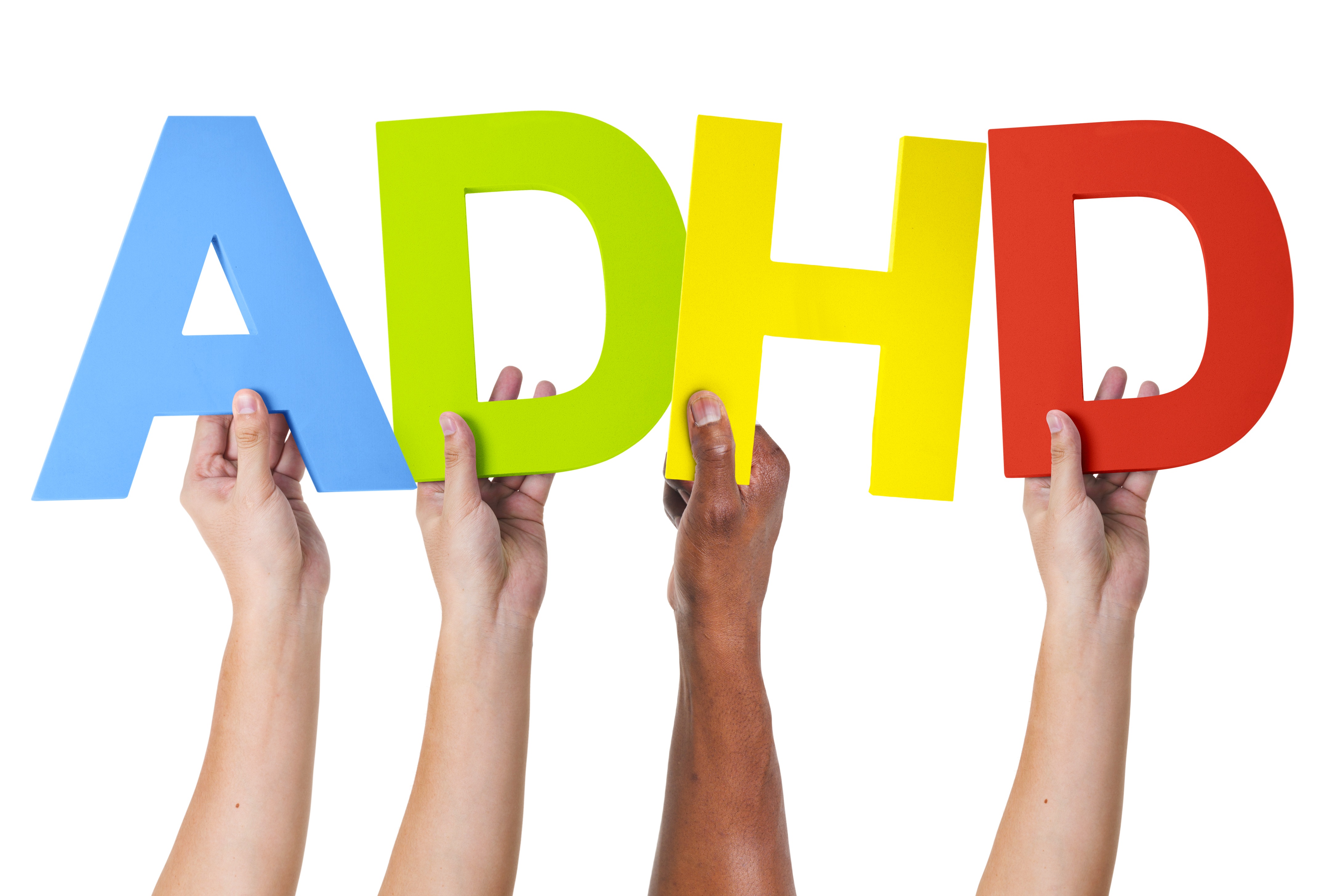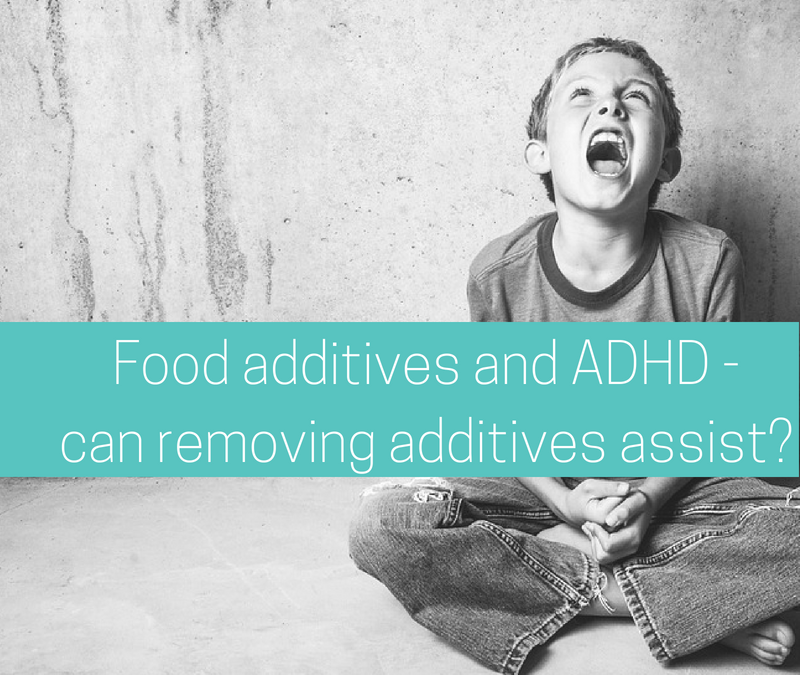Food Additives and ADHD – can removing additives assist with ADHD symptoms?
It is estimated that one in 20 children in Australia have Attention Deficit Hyperactivity Disorder (ADHD). ADHD is much more common in boys. We need to consider Is there a link between food additives and ADHD?
Firstly, we need to look at what is Attention Deficit Hyperactivity Disorder (ADHD)?
ADHD is characterised as a developmental disorder of:
– inattention
– impulsivity
– hyperactivity (1)

Inattention often includes difficulty concentrating, forgetting instructions, trouble paying attention and finishing tasks.
Impulsivity symptoms include being accident prone, inability to control emotions easily or talking over the top of others.
Hyperactivity often includes restlessness in that the child is unable to sit still, fidgets constantly or on the go all the time.
Secondly, what is the cause of ADHD?
The research is still unclear as to what the cause of ADHD is.
Studies are showing that ADHD runs through families together with other environmental factors including toxicity and poor nutrition during infancy. (2) (3) (4) (5)
Also, research indicates that ADHD is believed to be “a result of abnormalities in the frontal regions of the brain, particularly the prefrontal cortex and associated subcortical structures and circuits”
Studies have demonstrated that patients with ADHD have “depleted levels of dopamine and norepinephrine thought to be largely the result of their respective transporter systems (6)

How is ADHD diagnosed?
If you believe your child could be showing ADHD symptoms head to your local general practitioner (GP).
Your GP might refer your child to a paediatrician, a psychologist or a child psychiatrist.
Normally a diagnosis will involve:
-
interviewing parents (primary carers) of the child;
-
interviewing your child;
-
reviewing behavioural checklists completed by the child’s carers / teachers;
-
discussions with teachers / carers;
-
developmental checks such as language, speech, movement, learning, educational and
-
hearing tests.
The symptoms associated with ADHD can overlap with many other medical and behavioural conditions.
What are typical symptoms of ADHD?
“Behaviours are assessed to determine whether they are outside of normal limits.
This is the traditional assessment method and the behavioural observations do not look for causes.
It is based solely on the DSM-IV behavioural criteria for ADHD.” (7)
The DSM-IV behavioural criteria include (8):
Symptoms of inattention:
– Does not give close attention to details or makes careless mistakes in schoolwork, work, or other activities
– Has trouble sustaining attention in tasks or play activities
– Does not seem to listen when spoken to directly
– Does not follow through on instructions and fails to finish schoolwork, chores, or duties in the workplace
– Has trouble organising tasks and activities
– Avoids, dislikes, or is reluctant to engage in tasks that require sustained mental effort (such as homework)
– Loses things necessary for tasks or activities (toys, school assignments, pencils, books, or tools)
– Is easily distracted by external stimuli
– Is forgetful in daily activities
Symptoms of hyperactivity and impulsivity
Hyperactivity:
– Fidgets with hands or feet or squirms in seat
– Leaves seat in classroom or in other situations in which remaining seated is expected
– Runs about or climbs when and where it is inappropriate
– Has trouble playing quietly or enjoying leisure activities quietly
– Is ‘on the go’ or acts as if ‘driven by a motor’
– Talks excessively
Impulsivity:
– Blurts out answers before questions have been completed
– Has trouble waiting his or her turn
– Interrupts or intrudes on others (such as butting into conversations or games)
Children must have at least six symptoms from either (or both) the inattention group of criteria and the hyperactivity and impulsivity criteria.
If you think your child is exhibiting at least 6 of the symptoms from either (or both) of the group of criteria, visit your GP or Paediatrician for a diagnosis.
How does ADHD impact the family?
ADHD can affect children’s learning and social skills, and also family functioning.
Sleeping problems ie difficulty getting to sleep and staying asleep overnight can make school even more challenging.
Other issues may develop in conjunction with ADHD including Oppositional Defiance Disorder (ODD) and anxiety or depression.
ADHD can put a strain on family life including stress on family relationships and in some cases breakdown brining additional social and financial difficulties. Other impacts include reduced parenting efficacy and increased levels of parent stress. (9)
Can diet changes improve ADHD symptoms?
Dietary changes have been suggested as a way of reducing ADHD symptoms (10).
The impact of dietary changes and food’s effect on behaviour is still relatively new and controversial.
However, it has been proven that nutritional deficiencies can affect behaviour (11)
Even vitamin and mineral supplements have shown to decrease antisocial behaviour in children (12)
It is entirely plausible that if these supplements have been proven to influence behaviour, it could also affect ADHD symptoms given the large behavioural component associated with ADHD diagnosis.

Research has investigated the impact that supplementation or elimination strategies can have on reducing ADHD symptoms.
Supplementation studies have looked into the effects of amino acids, vitamins, minerals and omega-3 fatty acids on ADHD symptoms (13) (14) (15) The results are mixed but the research shows lots of promise.
Elimination studies
Children with ADHD are more likely to have adverse reactions to food.
A study conducted on seventy-eight children that were referred to a diet clinic because of hyperactive behaviour, were placed on a ‘few foods’ elimination diet.
Fifty nine improved in behaviour during this open trial.
The study shows that “observations of change in behaviour associated with diet made by parents and other people with a role in the child’s care can be reproduced using double blind methodology and objective assessments. Clinicians should give weight to the accounts of parents and consider this treatment in selected children with a suggestive medical history.” (16)
Unfortunately at this point in time, very few clinicians suggest parents try removing harmful food additives from our children’s diet first!
Additive Free Kids have helped so many families that were facing an ADHD diagnosis.
The mums of these children just didn’t feel the ADHD diagnosis was right for their child and explored other alternatives before resorting to medication.
They have seen amazing success!
Whilst removing harmful food additives may not work for everyone, it is worth a try, there is nothing to lose.
Studies have examined the effects of eliminating many ingredients, including food additives, preservatives, sweeteners and allergenic foods.
Recent studies have shown:
– “artificial food colours are not a major cause of ADHD per se, but seem to affect children regardless of whether or not they have ADHD,” (17)
– “artificial colours or a sodium benzoate preservative (or both) in the diet result in increased hyperactivity in 3-year-old and 8/9-year-old children in the general population.” (18)
– behavioural changes in irritability, restlessness, and sleep disturbance are associated with the ingestion of tartrazine in some children. A dose response effect was observed. (19)
Despite the results of these studies the debate still continues.
To conclude:
The decision rests with you. Do your own research.
Conduct your own experiment.



What are some of the additives or colours that I should be looking for on the labels to eliminate from my son’s diet?
For how long after the exposure of additives or preservatives would any adverse behaviors last for?
Hi Philippa
Thank you for your comment. It varies for each individual – generally one exposure will last 2-3 days.
Frankie
Hi Melinda
You would want to look into avoiding Colours, Artificial Sweeteners, Preservatives, Antioxidants and Flavour enhancers as a starting point.
who is the author of this article and what is the location of this institution?
Hi Melania
You have visited the Additive Free Kids website and we are located in Australia. Can I help you? Feel free to email me at fr******@ad**************.au